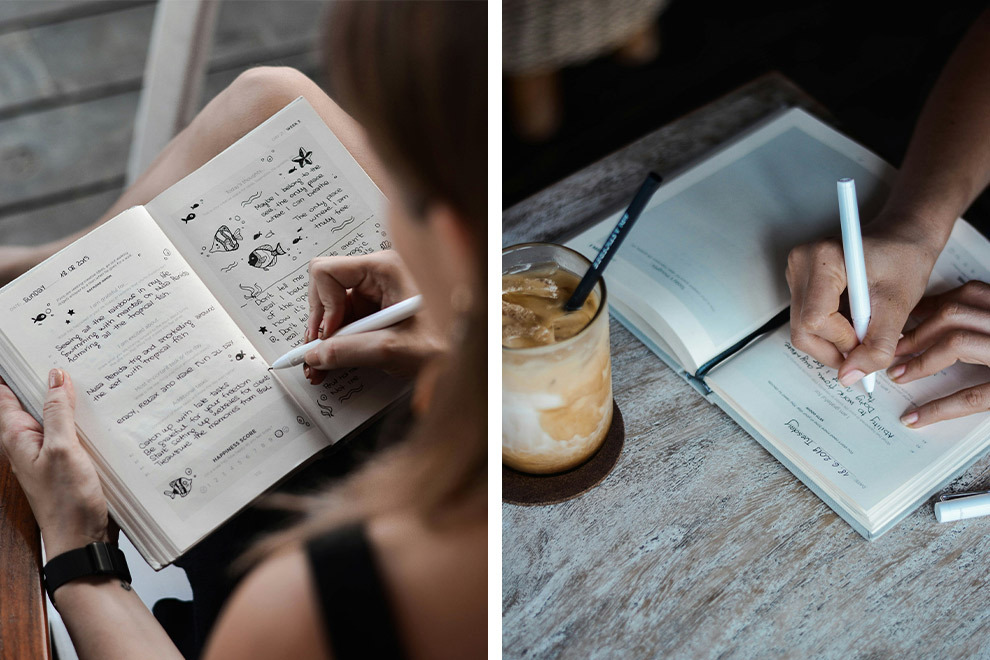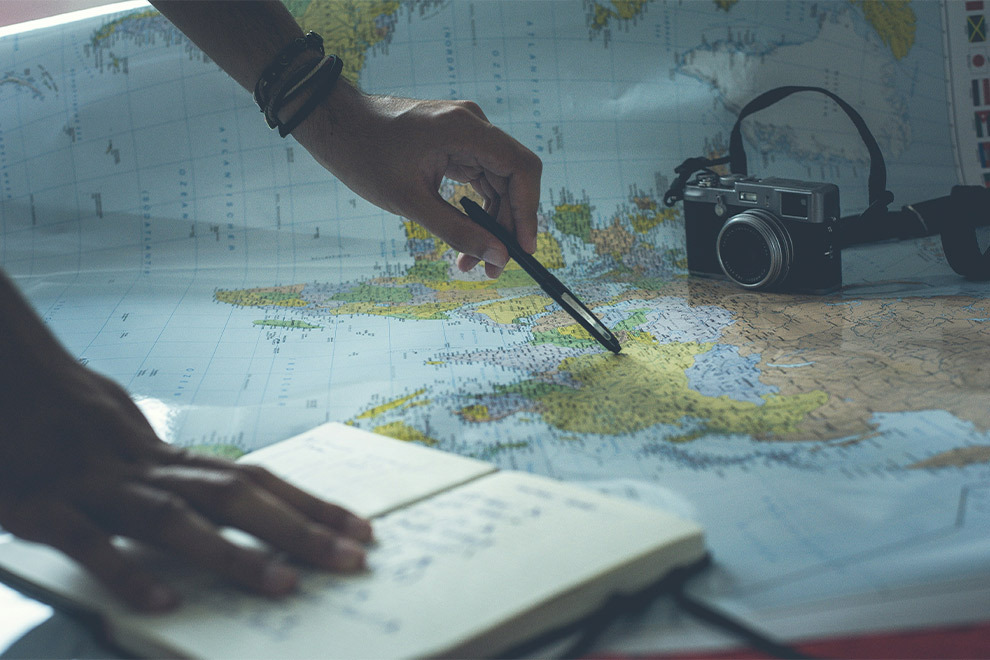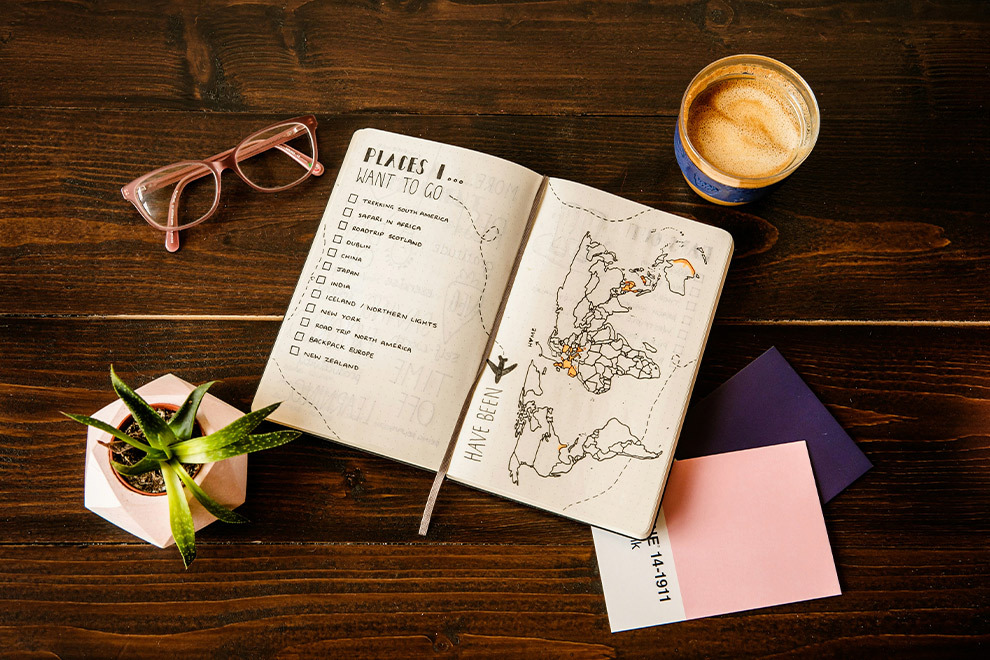The many benefits of journaling
In a world that seems to move at a pace faster than most of us can keep up with, there's something uniquely calming about slowing down enough to get our thoughts and feelings in order. Journaling is a mindfulness exercise that’s been making a comeback recently, whether it's the soothing practice of putting pen to paper, or taking time out to type what’s been going on.
Paula van de Kamp
Photo: Nick Morrison/Unsplash
Aug 16 2024
|
JOURNALING
Journaling goes way beyond just documenting the everyday movements of life; it has a range of benefits for mental well being, fostering creativity, personal growth, and enhancing our travel experiences. In this post, I’m going to delve into some of my favorite perks of journaling and how this timeless tradition can add immense value to your life in ways you might not have imagined.

Photos: Prophsee Journals/Unsplash
Journaling Improves mental health
Journaling can help boost our mental health and is an incredibly valuable tool for getting our thoughts and feelings out of our heads. Here are some of the ways I think that the practice of journal helps to generate and maintain feelings of calm centeredness:
Stress relieving
Journaling has an almost magical ability to reduce stress. Pouring out your thoughts and emotions onto paper can be wonderfully therapeutic, allowing you to unload burdens and worries. Externalizing struggles often brings relief and clarity making it easier to navigate through stressful situations rather than keeping it all bottled in.
Studies have show that this practice can actually reduce cortisol levels—the body’s stress hormone. Through journaling you cultivate a habit of introspection and self awareness that helps you with identifying stress triggers and builds the development of coping strategies.

Photo: Patrick Schneider/Unsplash
Expressing emotions and finding healing
Writing in a journal offers a space for letting out your emotions. Whether you're grappling with sorrow, frustration or melancholy, jotting down these sentiments can have a soothing effect. This practice enables you to work through your feelings instead of bottling them up which plays a vital role in emotional recovery.
Keeping a journal enables you to monitor patterns and triggers. By revisiting your entries you can uncover insights into how you react and spot recurring themes that you might have missed if you hadn’t been writing them down. This understanding empowers you to make adjustments that enhance your well being.

Photo: William Farlow/Unsplash
Boosting self understanding
Journaling nurtures a sense of self awareness. Through reflections on your experiences, thoughts, and emotions you develop a clearer understanding of who you are and what holds deeper significance for you. This heightened self awareness can lead to a much more mindful way of living as you become more attuned to your values and aspirations.
Self awareness also sharpens decision making skills. When you have a realistic grasp on your motivations and wishes you can make decisions that align better with your true nature rather than outdated beliefs.
Journaling offers cognitive advantages
It’s not only our emotional landscape that benefits from spending time reflecting on where we are in our lives, our brains get a workout too.
Enhanced memory retention and understanding
Jotting things down helps us to cement in our memories, which enhances comprehension and other cognitive processes such as thinking, writing, and reading. Writing about events in our lives and our feelings about them strengthens the brain connections that link to both memory and comprehension.
Beyond that, the act of recording your insights can deepen your understanding of the subject matter. Whether you're a student or a working professional, summarizing ideas, reflecting on lessons learned, and relating new information to personal experiences can improve how well you remember and understand it.
Journaling Boosts creativity
Writing in a journal is a tool for nurturing creativity. When you write freely without worrying about grammar or structure your mind can roam freely while exploring new concepts. Many writers, artists and thinkers use journaling as a way to brainstorm and develop new ideas while keeping the inner grammar critic quiet.
By keeping a journal you create a space where your imagination is free to wander. This unfiltered exploration can lead to insights and creative solutions to issues that might have previously left you bewildered. Recording thoughts and ideas also helps prevent creative blocks and keeps the inspiration flowing continuously.

Photo: Emma Dau/Unsplash
Journaling is a tool for personal development
Personal development feels like a bit of a buzzword at the moment. And, it should stay in the limelight from now on. We need to spend time consciously growing and learning and journaling is a great way to access different pathways of self development.
Setting goals and achieving them
Journaling is a brilliant method for setting goals, tracking progress, and recording your feelings about the whole process. Putting your objectives into writing makes them feel more real and achievable, especially when you break your goals down into smaller, more manageable tasks.
Your journal is also a great place to go to review how far you’ve come and can help with motivation and accountability. Taking the time to reflect on your achievements, areas of growth, and places you could do better gives you a unique opportunity to adjust your plans and stay focused.

Photo: Anastasia Nelen/Unsplash
Improving problem solving skills
Writing about challenges in a journal and brainstorming solutions can enhance your ability to solve both personal and work related problems. Describing a problem in detail helps you to see and understand it better, making it easier to analyze and find solutions. Journaling allows you to consider different viewpoints and explore multiple solutions before choosing the best one.
And, there’s something amazing about revisiting journal entries where you successfully tackled issues that can boost your confidence and serve as a guide for dealing with future problems. This cycle of reflection and action can deepen your feelings of self trust and improve your problem solving skills over time.
Developing resilience
There’s no doubt that life has its share of challenges for us all and we need to build resilience in order to navigate those pitfalls successfully. You can use journaling as a tool for building resilience by writing about difficult experiences and how you managed to overcome them. You are effectively creating a record of your own resilience and adaptability that can offer inspiration during tough times.

Photo: Yukie Emiko/Unsplash
Traveling and writing
For anyone that loves to take holidays, for those who have only been away from home a few times, or the seasoned globe-trotting travelers amongst us, writing while traveling is such a beautiful way of recording our adventures.
Preserving memories
Traveling offers experiences that ask to be kept close to the heart and remembered forever and a journal is a great way to capture these memories. Unlike photos, which only freeze moments in time visually, journaling allows you to document your thoughts, feelings and sensory encounters in enormous depth. The aroma of a market, the chatter of an unfamiliar language, or the sense of wonder at a stunning landscape can all be vividly portrayed in your journal.
By maintaining a travel diary you craft a storyline of your adventures. This not only improves your memory of the trips but also creates a treasured memento to revisit later on. Reading through your travel diary can transport you back to those times enabling you to relive the moments and emotions in perfect detail.

Photo: Josh Hild/Unsplash
Enriching travel experiences
Journaling can enhance your travel adventures by prompting you to engage deeply with your surroundings. When you take the time to contemplate what you observe, hear, and feel you become more present and attentive to what’s happening in every moment. This heightened awareness can lead to an even more deeply immersive and meaningful travel journey.
Reflecting on your interactions with locals, new traditions, and unfamiliar settings can offer insights into lives and worlds that look and feel very different from your own. These insights nurture a deeper respect for the destinations you explore and the people that live there.
Engaging in contemplation about our relationship to people and places helps us to broaden our perspective, deepen empathy, and better understand others..
Planning and reflecting
Keeping a travel journal is also a brilliant method for the planning stages of any trip. Before embarking on a journey you can utilize your journal to research and organize your schedule, jotting down must visit sights, local dishes to sample, and cultural customs to be mindful of. This level of mindful preparation can enhance the smoothness and enjoyment of your travels.

Photo: Glenn Carstens-Peters/Unsplash
After your adventures, reflecting on your experiences in writing can offer valuable insights. You can assess what brought you the most joy, what changes you would make and what lessons you have learned along the way. This introspection can guide you towards planning journeys that are even more enriching.
Journaling techniques and suggestions
There are so many ways you can journal and each of them have different benefits for different situations. Try them all out for size and see which methods fit with your needs and lifestyle the best.
Discovering Your Approach
There isn't one particular right way of keeping a journal; finding a style that suits you is the most important element for maintaining a consistent practice. Some people prefer to simply jot down whatever comes to mind in the moment while others may choose structured prompts or specific topics. Experiment with styles to uncover what feels most comfortable and beneficial for you.

Foto: Andrew Neel/Unsplash
Consistency trumps quantity
Consistency holds much more importance than the just volume of writing. Even if you only write a few sentences each day, the simple act of committing to the regular habit of journaling can bring significant advantages. Make sure to dedicate a time each day for writing in your journal whether it's in the morning to set your intentions for the day or in the evening to reflect on your experiences.
Utilize writing prompts
If you're not sure what to write about, prompts can be really beneficial to a blank mind. They can range from questions that make you think, "What am I thankful for today?", to tasks such as "Describe a place you dream of visiting with vivid details." Writing prompts serve as a bit of that magical fairy dust to spark your imagination and encourage you to explore different aspects of your life and creativity. A simple search on the internet can provide you with hundreds of inquisitive journal prompts that will have you exploring uncharted territory in your mind.
Be genuine and open minded
Your journal serves as a haven where you can be completely honest with yourself without anyone else telling you what to think and feel. Write without worrying about being judged or criticized. Allow yourself to express your thoughts and emotions knowing that this authenticity is crucial for self development and to reap the full benefits of journaling.

Photo: Kinga Howard/Unsplash
Digital journals vs. traditional journals
Some of us like to write on hand woven paper, in traditional fountain pen ink, while others love to touch type as quickly as their thoughts can pour out. There’s no one way that’s better than another and nobody should be judged for their chosen way of getting their thoughts on the page.
Digital journals
Digital journaling offers the immense convenience of access and organization. Through apps and software you can write whenever inspiration strikes, adding photos and links, and effortlessly search through your entries. Digital journals like the Travel Diaries app also ensure that all your precious writings are securely backed up.
However digital journaling may lead to distractions from notifications and other apps beeping or flashing up on the screen while you are trying to focus on something deeply. To address this issue, think about using diary apps that offer a focused and distraction-free setting, or switch off your notifications while journaling.

Photo: John Schnobrich/Unsplash
Conventional diaries
Writing with a pen and paper in a journal offers a hands-on and engaging experience. It’s like creating your own physical book of thoughts, feelings, and memories. Handwriting can also boost memory and understanding as we move our hands in rhythm with our thoughts.
There’s also something uniquely intimate and personal about having a connection to a physical diary. The traditional analog method feels particularly gratifying and grounding. You also have the benefit of being able to take out pages and burn them in a cathartic ceremony if that’s part of your practice. Simply highlighting text and pressing “delete” doesn’t have quite the same effect.
Deciding between traditional journals ultimately depends on personal preference. Some people even combine both using journals for quick entries on the go and traditional ones for deeper reflective writing sessions.

Photo: Gift Habeshaw/Unsplash
Final thoughts on the habit of journaling
The impacts of journaling are bountiful and far reaching into our emotional and cognitive landscapes. We can enhance our self awareness, build resilience, and improve our memories simply by writing down how we experience the world.
When it comes to traveling, I find that keeping a journal transforms my adventures into stories that I can revisit and treasure forever. It’s strengthened my bond with the places I’ve explored and deepened my appreciation for culture enormously. I would strongly recommend that anyone thinking of taking a trip packs a notebook or uses an app like Travel Diaries to document the heart of the experience.
In a society that frequently feels hectic and demanding, keeping a journal provides a moment of quiet respite—an opportunity to contemplate, understand and evolve. Embrace this age tradition and explore the numerous ways in which it can enrich your experience of life.

Photo: That's Her Business/Unsplash
Create your own blog
Easily add stories to your diary in our online editor or app
Add your images and choose your pages layouts
Share your journey in real time without the fuss!





